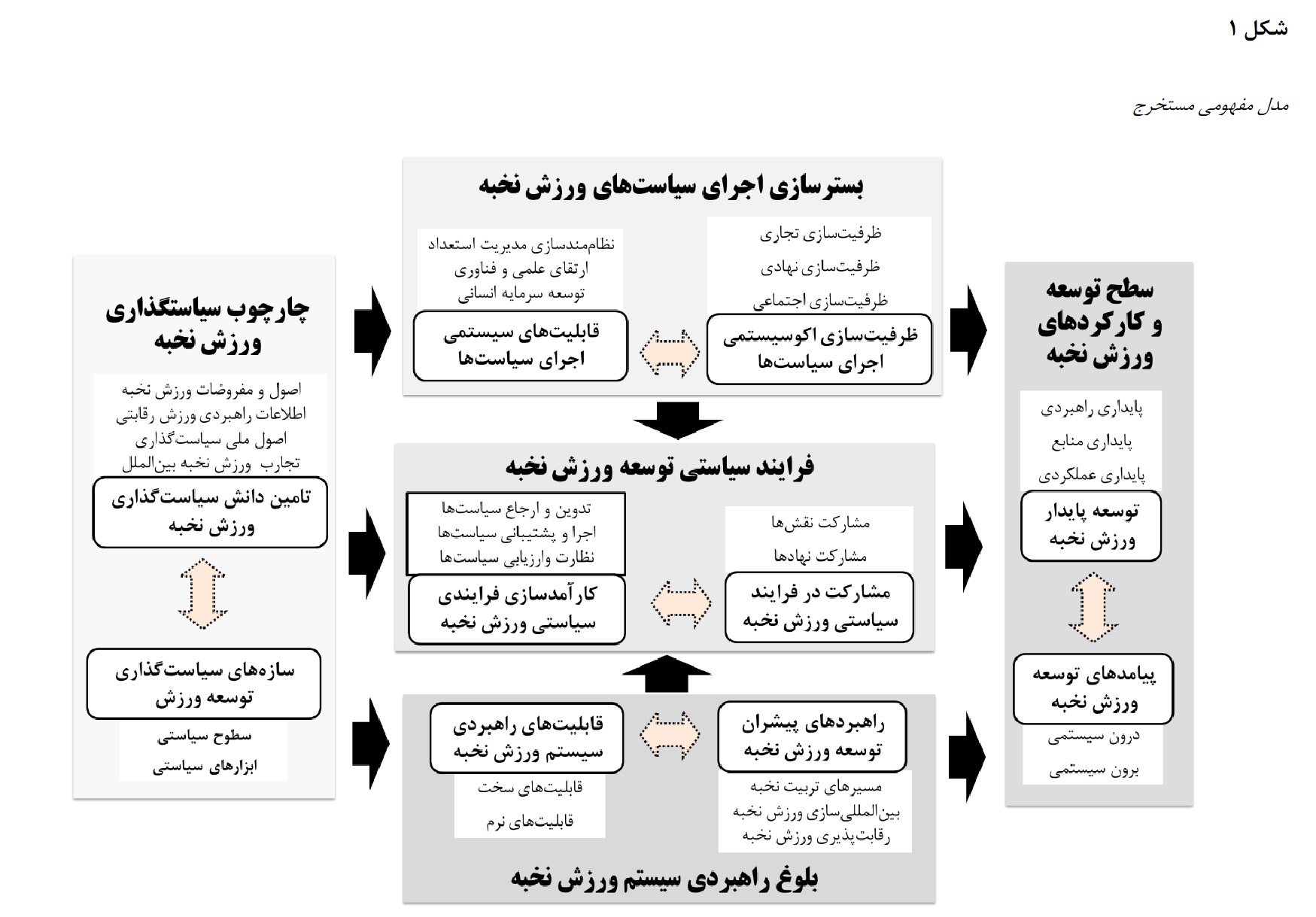Policy Making for the Maturity of Elite Sports in Iran: The Role of Contexts, Processes, and Development Levels
Keywords:
Elite Sports Maturity, Sports Development, Elite Sports, Policy MakingAbstract
The objective of this study was to analyze the policy making for the maturity of elite sports in Iran, focusing on the role of contexts, processes, and development levels. The research method was qualitative with a systematic analysis approach. The statistical population included all faculty members of physical education, managers and experts of executive and professional sports organizations, and scientific documents and resources. The statistical sample was selected purposefully and conveniently based on theoretical saturation (16 individuals and 28 documents). The research tools included systematic library study and semi-structured interviews, and the validity of the tools was assessed using qualitative validation methods (content validity). Coding and conceptual framing methods were used to analyze the findings. The conceptual framework of elite sports policy making in Iran was identified in 10 perspectives and 5 conceptual levels: the framework of elite sports policy making, groundwork for implementing elite sports policies, the policy process for elite sports development, the strategic maturity of the elite sports system, and the development level and functions of elite sports. The framework presented in this study provides an understanding of the dimensions of policy making for elite sports development based on its relationship with a set of various activities. Based on this framework, an objective evaluation of management activities in elite sports can be conducted, and scientific information regarding appropriate actions that sports organizations should undertake for the development of elite sports policy making can be provided.
Downloads
References
Bramham, P., Hylton, Kevin, Jackson, Dave. (2007). Sports development: Policy, process and practice. Routledge.
De Bosscher, V. (2008). The global sporting arms race: An international comparative study on sports policy factors
leading to international sporting success. Meyer & Meyer Verlag.
https://books.google.com/books?hl=fa&lr=&id=41PXkIRtgSMC&oi=fnd&pg=PA13&dq=.+(2008).+A+Global+s
porting+arms+race.+An+international+comparative+study+on+sports+policy+factors+Leading+to+international+s
porting+success.+Aachen,+DE:+Meyer+%26+Meyer.&ots=8YYzXhR2df&sig=MuC5xtMhX3j2c950G_Mh6NA1
gIo#v=onepage&q=.%20(2008).%20A%20Global%20sporting%20arms%20race.%20An%20international%20co
mparative%20study%20on%20sports%20policy%20factors%20Leading%20to%20international%20sporting%20s
uccess.%20Aachen%2C%20DE%3A%20Meyer%20%26%20Meyer.&f=false
De Bosscher, V., De Knop, Paul, van Bottenburg, Maarten. (2008). sports, culture and society: why the netherlands are
successful in elite sports and belgium is not? a comparison of elite sport policies. Kinesiologia Slovenica, 14(2), -.
&asa=Y&AN=41028143&h=XDYfNJmgvDZkzlZXayZ4eXRXvpgHxaTXlz0JUDiXELRz4URCmQ4g793cjEa6
desdpHFH5b5vgEO7wN2KNi25cA%3D%3D&crl=c
De Bosscher, V., De Knop, Paul, Van Bottenburg, Maarten, Shibli, Simon. (2006). A Conceptual Framework for
Analysing Sports Policy Factors Leading to International Sporting Success. European Sport Management Quarterly,
(2), 185-215. https://doi.org/10.1080/16184740600955087
De Bosscher, V., De Knop, Paul, van Bottenburg, Maarten, Shibli, Simon, van Bottenburg, Maarten, Shibli, Simon,
Bingham, Jerry. (2009). Explaining international sporting success: An international comparison of elite sport systems
and policies in six countries. Sport Management Review, 12(3), 113-136.
https://doi.org/https://doi.org/10.1016/j.smr.2009.01.001
De Bosscher, V., Sotiriadou, Popi, van Bottenburg, Maarten. (2013). Scrutinizing the sport pyramid metaphor: an
examination of the relationship between elite success and mass participation in Flanders. International Journal of
Sport Policy and Politics, 5(3), 319-339. https://doi.org/10.1080/19406940.2013.806340
Gao, R. Y. (2017). A comparison between Talent Identification and Development (TID) for badminton in China and the
UK https://dspace.stir.ac.uk/handle/1893/25675
Green, B. C. (2005). Building sport programs to optimize athlete recruitment, retention, and transition: Toward a
normative theory of sport development. Journal of Sport Management, 19(3), 233-253.
https://doi.org/10.1123/jsm.19.3.233
Hasani, R., Nemati, Nematullah, Bagherpour, Tahereh. (2023). Identifying and Validating Strategies Affecting the
Development of E-sports Clubs in Iran. Communication Management in Sport Media, 10(4), 29-41.
https://doi.org/10.30473/jsm.2022.62905.1599
Houlihan, B. (2005). Public sector sport policy: Developing a framework for analysis. International Review for the
Sociology of Sport, 40(2), 163-185. https://doi.org/10.1177/101269020505719
Rahimi Pordanjani, A., Rashidiniya, Mostafa, Mirzaee, Bahman. (2017). The relationship between economic capital and
the development goals of Sports success wrestlers in freestyle and Greco-national youth team. Contemporary Studies
On Sport Management, 7(14), 43-52. https://doi.org/10.22084/smms.2018.14412.2088
Ramzaninejad, R. (2017). Basic facts of sports development and their applications in sport of iran. 91(24), 233-263
https://www.sid.ir/paper/224915/en
Renaud, A., De Bosscher, Veerle, Kempf, Hippolyt. (2018). Modelling international sporting performance: the impact of
national sport policy factors. Conference or Workshop Item, no(no), -. https://arbor.bfh.ch/10433/
Sabbaghian, A. (2016). Sport Diplomacy. Journal of Culture-Communication Studies, 16(31), 132-151.
https://www.jccs.ir/article_12599_75c9f2f7e9380acca945e71011b6cfdf.pdf
Shabani Bahar, G., Erfani, N., Goodarzi, M., & Monsef, A. (2015). Application of path analysis model in explaining
Indicators that have influence on success of sports teams in international events. Applied Research in Sport
Management, 3(3), 117-131.
https://arsmb.journals.pnu.ac.ir/article_1552_1878dffbc8a121624d3cd0c6ebcea478.pdf
Shariati Feizabadi, M., Goodarzi, Mahmood. (2016). The Effectiveness of Political System of Islamic Republic of Iran;
A Model for Evaluation. Bi-Quarterly Political Knowledge, 11(2), 95-127. https://doi.org/10.30497/pk.2016.1778
Sotiriadou, K. (2005). The sport development processes in Australia https://opus.lib.uts.edu.au/handle/2100/282
Sotiriadou, K., Shilbury, David. (2009). Australian Elite Athlete Development: An Organisational Perspective. Sport
Management Review, 12(3), 137-148. https://doi.org/10.1016/j.smr.2009.01.002
Sotiriadou, K., Shilbury, David, Quick, Shayne. (2008). The attraction, retention/transition, and nurturing process of sport
development: Some Australian evidence. Journal of Sport Management, 22(3), 247-272.

Downloads
Published
Issue
Section
License

This work is licensed under a Creative Commons Attribution-NonCommercial 4.0 International License.










